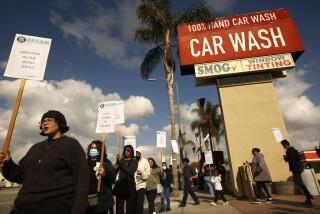Riot Games accuses regulators of ‘questionable tactics’ to block gender bias settlement
Two California state agencies are trying to stop Riot Games from finalizing a $10-million settlement with female employees in a gender discrimination class action suit, arguing that the women could be entitled to $400 million and the process has been rushed.
Now Riot and the lawyers for the plaintiffs have joined forces in seeking to convince the court that those objections are baseless and rooted in faulty math.
In a document filed Jan. 22, the Los Angeles game studio said that the Department of Fair Employment and Housing’s objection is “completely lacking in factual or legal support and is instead rife with inflammatory misstatements and insinuations,” and that the agency is “not above questionable tactics in attempting to pressure Riot,” including smears in the media.
Rosen Saba, the law firm representing the women who worked at Riot, filed similar sentiments, writing that “at its core, the DFEH’s objection is no more than a salacious effort to undermine an arms-length settlement between the actual parties in this case which was reached over several months of intense and laborious negotiations.” The firm added that the agency lacks legal standing to object in the first place.
The fracas comes at a crucial point in the case, as Riot and Rosen Saba wait for the Los Angeles County Superior Court to approve their preliminary settlement.
The suit began in November 2018 when women who worked at Riot sued over violations of the California Equal Pay Act, alleging that the company fostered a “men-first” “bro culture” in which women were routinely subjected to sexual harassment and gender discrimination. It followed a series of exposés casting a harsh light on Riot’s workplace practices.
In a statement, Department of Fair Employment and Housing spokesperson Fahizah Alim said that the state’s $400-million estimate of what the women may be entitled to relies on the methodology included in the settlement itself, but that “the major difference in the numbers is that DFEH included stock or equity compensation in its settlement estimate.” She added that the agency filed the objection as an attempt to force Riot and Rosen Saba to make clearer arguments for their proposed settlement before it was approved by the court.
In its filings, Riot argues that stock compensation, which often makes up a significant percentage of total compensation at fast-growing start-ups, does not fall under the aegis of wage discrimination laws, and that the state’s estimate fails to follow the legal requirement to account for differences in job title and experience between male and female employees.
The Division of Labor Standards Enforcement has also filed an official objection to the settlement and a request to officially intervene in the case, arguing that the plaintiffs’ lawyers failed to do their due diligence in coming to the settlement, and that the terms of the settlement sign away Riot’s liability for potential labor law violations beyond the initial purview of the lawsuit. Riot and the plaintiffs’ lawyers argue that the labor division is wrong and the case is procedurally sound.
The court is scheduled Feb. 3 to either approve the preliminary settlement or heed the state agencies’ advice and send both sides back to the drawing board.







